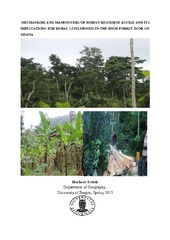| dc.description.abstract | The management of Ghana's Forests has attracted diverse social actors with multiple interests from the state (Forestry Commission, FC) to local level (local forest users). This has resulted in processes and mechanisms within and outside the legal system of gaining access to the forests and related resources. Mechanisms within the legal system include the forest governance policies which necessitates gaining access through a permit from the FC. The bureaucratic and sometimes frustrating nature of the permit system has served as a springboard for certain social actors such as farmers and chainsaw operators, to put up crafty ways of accessing and benefitting from the forests. This crafty ways is what I refer to as manoeuvrings in this study; which are occurring as a result of the emergence and continuance of the forest governance policies. This suggests that regulations and policies are not always a panacea for sustainable forest governance. With this background and using qualitative research methods and techniques, this study examined how local forests users are able to manoeuvre forest resource access. To achieve this, a field study of a period of three months was undertaken in Ghana. The study drew on the Political Ecology Approach (Bryant and Bailey, 1997), the Theory of Access (Ribot and Peluso, 2003) and the Entitlement Approach by Leach et al., (1999) to achieve the research objectives. Taking the Political Ecology Approach, this study found that benefiting from the forests reflects the interests of both the forestry officials and the local forest users. Furthermore, the forestry officials and the local forest users are characterized by unequal power relation. That is the forestry officials are the real determinants of who gains access and who loses out on access in relation to the forests resources. Using the Theory of Access, the local forest users in other to meet their interests by benefiting from the forests, enter into social relationships with the forestry officials to manoeuvre forest resource access. By investing in these social relationships, the local forest users are able to negotiate, manipulate and bribe the forestry officials to grant them access to the forests. Further, by drawing on the Entitlements Approach, this study found that informal institutions carried more weight than the formal institutions in manoeuvring forest resource access by the local forest users. That is the local forest users invested in social networks and relied more on the agreements, negotiations and arrangements between themselves and the forestry officials to manoeuvre forest resource access and to benefit from the forests. The study concludes that, the structures of the Forestry Commission be strengthened well enough to ensure the sustainable management of the forests. Further, better schemes must be put in place to enable the participation of local forest users in the sustainable management of the forests. | en_US |
